“I’ve never been a good employee. I’ve always been an independent worker.”
Fellow Lindiwe Matlali sat down with TechWomen to discuss the success story of her globally expanding Africa Teen Geeks (ATG) initiative and the launch of a new accelerator to take place at the World Economic Forum in Davos, Switzerland this coming January 2023.
Her work with ATG was highlighted by U.S. Secretary of State Antony Blinken in the TechWomen@10 anniversary celebration as an example of the impact TechWomen Fellows are having around the globe.
Secretary Blinken mentions Lindiwe Matlali (02:14 – 2:50) in his TechWomen@10 address
The following day, she was contacted by a business partner who had seen the video and wanted to increase their funding exponentially as a result. As the details of this historic partnership and growth are solidified over the next few months, let’s dive deeper into Lindiwe’s story and how she grew an idea into a movement.
“It’s not that we don’t have talented kids in South Africa. We do. It’s lack of opportunity and a lack of access.”
Educated in Data and Economics, Lindiwe became a CEO when she founded Apodytes (Pty) Ltd, a market research firm, in 2008. She partnered with Swedish company Tobii to deploy eye-tracking technology for advertising data gathering. “It has since evolved and we are now a fully-fledged tech company that provides small and midsized enterprise support, IT strategy and digital transformation for private and government entities,” Lindiwe explained.
In 2014, Lindiwe attended a week-long executive training program at the Massachusetts Institute of Technology (MIT) in Boston. Inspiration struck when she met an 8-year-old girl who had developed a successful mobile application. Thinking about her own children aged four, six, and ten at the time, Lindiwe thought, why don’t we have that at home? “It’s not that we don’t have talented kids in South Africa. We do. It’s lack of opportunity and a lack of access.” At the time, South Africa had only just introduced coding into its curriculum, and even then, it was only offered at affluent schools to grade 10 to 12 students. Lindiwe decided that she was going to do something to expose kids in smaller townships and underserved communities to these skills.
She immediately cold-contacted Mteto Nyati, then-managing director of Microsoft in South Africa. “I’m never shy about finding someone on Google and sending them an email,” Lindiwe stated through laughter. “I would send an email to (U.S. President) Joe Biden if I needed to.”
To Lindiwe’s surprise, Nyati answered her email right away and agreed to a meeting to discuss her vision. Upon returning home from Boston, Lindiwe went straight from the airport to her appointment with Nyati who agreed on the spot to fund a $10,000 USD seed grant for Lindiwe’s idea, which was still so fresh that it was not even an official entity. “I had to immediately incorporate Africa Teen Geeks just to accept the funding,” she explained. Microsoft also agreed to offer staff support and hosting at their facilities as well as free airtime and data for kids who completed a certain training program so that they could continue coding at home.
With that, Africa Teen Geeks was born.
Coincidentally, around this same time, Adriaan Pottas from the University of South Africa (Unisa) Science Campus in Florida had reached out to Lindiwe to request the slides she had presented during a talk at a marketing research conference. In a follow-up interview with Pottas, Lindiwe inquired about whether she might bring her first cohort of Africa Teen Geeks to the UNISA campus. The man replied that he was, in fact, in charge of the coding lab and would be happy to host them.
On a Saturday afternoon soon after that conversation, Lindiwe loaded 60 kids aged 6-18 from the underserved township of Tembisa, Johannesburg into a van bound for the UNISA campus in Florida for what was meant to be a 4-hour training session from 8:00 am to 12:00 pm. However, when 12:00 noon rolled around, the kids were not ready to leave. “Okay, we’ll give you an hour,” Lindiwe recounted. “And then another hour. And then another. In the end, they did not leave until 4:00 PM.”
It was clear that Africa Teen Geeks was going to be a massive hit.
“Apodytes pays my bills. Africa Teen Geeks feeds my soul.”
“Africa Teen Geeks is not just about the hard skills,” Lindiwe explained. “It’s about instilling the right discipline, the right drive to know what is possible. Once that drive is in them, it will not even matter if they are homeless. They will find a way to go to that lab.”
Africa Teen Geeks took off at warp speed. “It was really ridiculous,” Lindiwe reminisced. “When we started, we didn’t think it was going to grow to such a level, but I guess we were lucky by the fact that we had South Africa’s biggest broadcaster supporting us,” she said, speaking of the South African Broadcast Channel (SABC) Foundation, headed by Hazel Thlabanyane, which provided free national media coverage for ATG. With Pottas also reaching out to University staff and faculty to all UNISA branches, “We basically went national instantly,” Matlali explained.
Within one year, ATG grew from 60 kids to 100,000 kids. Soon after that, she secured $50,000 in funding from Google. Then, Amazon Capetown took over the Capetown lab and other local and national businesses followed suit. In 2016, Oracle came on board. Jane Richardson, Senior Director of Oracle Academy for Europe, the Middle East and Africa, visited from the U.K. with the head of Oracle Academy, who taught an intro to Java training with the kids. Now, ATG is an Oracle Academy which allows participants to earn a Java certification.
During this period, Lindiwe also started her Master’s in Technology Management program at Columbia University. “That exposure really inspired me to want to make sure that disadvantaged children had options and would be able to start dreaming big.” She noticed that some of the most disadvantaged targets within her own were not appearing regularly at ATG events. She learned that they were struggling with transportation and were ashamed that they could not bring their own lunches to the day camps. So, ATG started providing free lunch at their events. “The head of HR at Amazon Capetown and her husband, then-Managing Director of Amazon South Africa, were both waking up early on Saturday mornings, making sandwiches for the children and supporting the program.”
“That’s when we reached out to the Department of Basic Education to ask them to teach coding as a standard subject. They said they didn’t have the money and support, but if ATG wanted to do it, we could.” So, ATG raised the money and provided the venues, transportation and hotels. They had students coming from nine provinces while also developing a coding curriculum.
“That’s something I’m proud to say,” Lindiwe reflected. “We contributed to the change of policy. Now, every child in every school will have access to the textbooks that ATG helped create. They will be translated into all 11 languages in South Africa. And since many teachers are not comfortable teaching computer science, we will also provide access to a series of free video lessons.”
“Before TechWomen, I was doing well, but just in South Africa. After TechWomen, global exposure started coming in.”
It was around this time, in 2016, that Lindiwe’s friend Jason Nagy, then-Africa Business Development Manager of the U.S. Trade and Development Agency (USTDA), suggested that she apply for the TechWomen program in Silicon Valley. “I assumed I wouldn’t make it, so I didn’t even apply,” Lindiwe admits. The following year he insisted, personally sending her the link to the application. Lindiwe finally completed the application and, was in fact accepted into the 2017 TechWomen program as an Emerging Leader.
“It opened up my opportunities and the way I viewed Africa Teen Geeks. Before TechWomen, I was doing well, but just in South Africa. After TechWomen, global exposure started coming in.”
During the D.C. Delegation trip of her TechWomen program experience, Lindiwe met mentor Eilieen Brewer, who was Director of Program Management of Symantec at the time. Brewer agreed to have Symantec host an Africa Teen Geeks delegation in Silicon Valley. Co-sponsored by South Africa’s Standard Bank, the event included students hailing from South Africa, Indonesia, the U.S. and beyond. ATG also started doing global hackathons, starting in Nigeria. Soon after that, Lindiwe partnered with the World Bank after networking with a co-speaker on a panel in Washington D.C. for the World Bank Youth Conference sponsored by the International Finance Corporation. This led to Yane Frenski, a consultant of the United Nations office of Drugs and Crimes, reaching out to her to form a partnership that is still in place today.
Africa Teen Geeks has since grown to include just over one million children and teachers in South Africa and abroad. Having expanded beyond the reach of Lindiwe’s sole management capacity, ATG is now a part of the Corporate Social Investment programming of Apodytes, with departments dedicated to Outreach, Department of Basic Education curriculum, Teacher Development and Stakeholder Management.
“I want every kid to know that they can create global companies by serving the underserved.”
It follows that Lindiwe has begun to receive recognition on the world stage. In 2019, she earned the distinction as the first African to win the German Digital Leader Award. In that same year, she was bestowed with the Point of Light Award by H.R.H. Queen Elizabeth of the U.K. (“I always tell my kids, you know the queen knew my name, right?”) Then, in 2020, she won the Social Innovator Award from the Schwab Foundation of the World Economic Forum (WEF).
“After winning the Social Innovator Award, I wondered, how can I get more involved with WEF?
Lindiwe became a contributing writer, interviewer, speaker and panelist for the World Economic Forum. She spoke at their Pioneers of Change event in 2020 and interviewed African-American tech-preneur and inventor of Voice over Internet Protocol (VoIP) Marian Croak, about whom she is also producing a documentary. She was also just recently named one of the 45 Most Influential Women in Digital Transformation 2021-2022 by CIO Magazine.
In her involvement with WEF, Lindiwe is particularly focused on democratizing access to power and influence by bringing in children from disadvantaged communities to participate in this exclusive business network. “How can we take children with skills and talent and put them in front of someone who can make it happen for them?” she asks.
As an answer to that question, this September at the United Nations Summit on Sustainable Development Goals in New York, a partnership was announced between Africa Teen Geeks, the Schwab Foundation and UpLink, a division of WEF tasked with supporting innovation. Together they “hope to build a movement of teen innovators and raise awareness of sustainability issues around the globe” with a program designed to arm the next generation of students with the hard and soft skills needed to lead creative STEM-based innovation and entrepreneurship in Africa.
“This is really about teaching kids how to innovate for non-consumption and innovate themselves out of poverty. It’s about leveling the playing field and a creating an ecosystem of innovators who can access WEF networkers, the people looking for those innovations,” Lindiwe concluded. “I want every kid to know that they can create global companies by serving the underserved.”


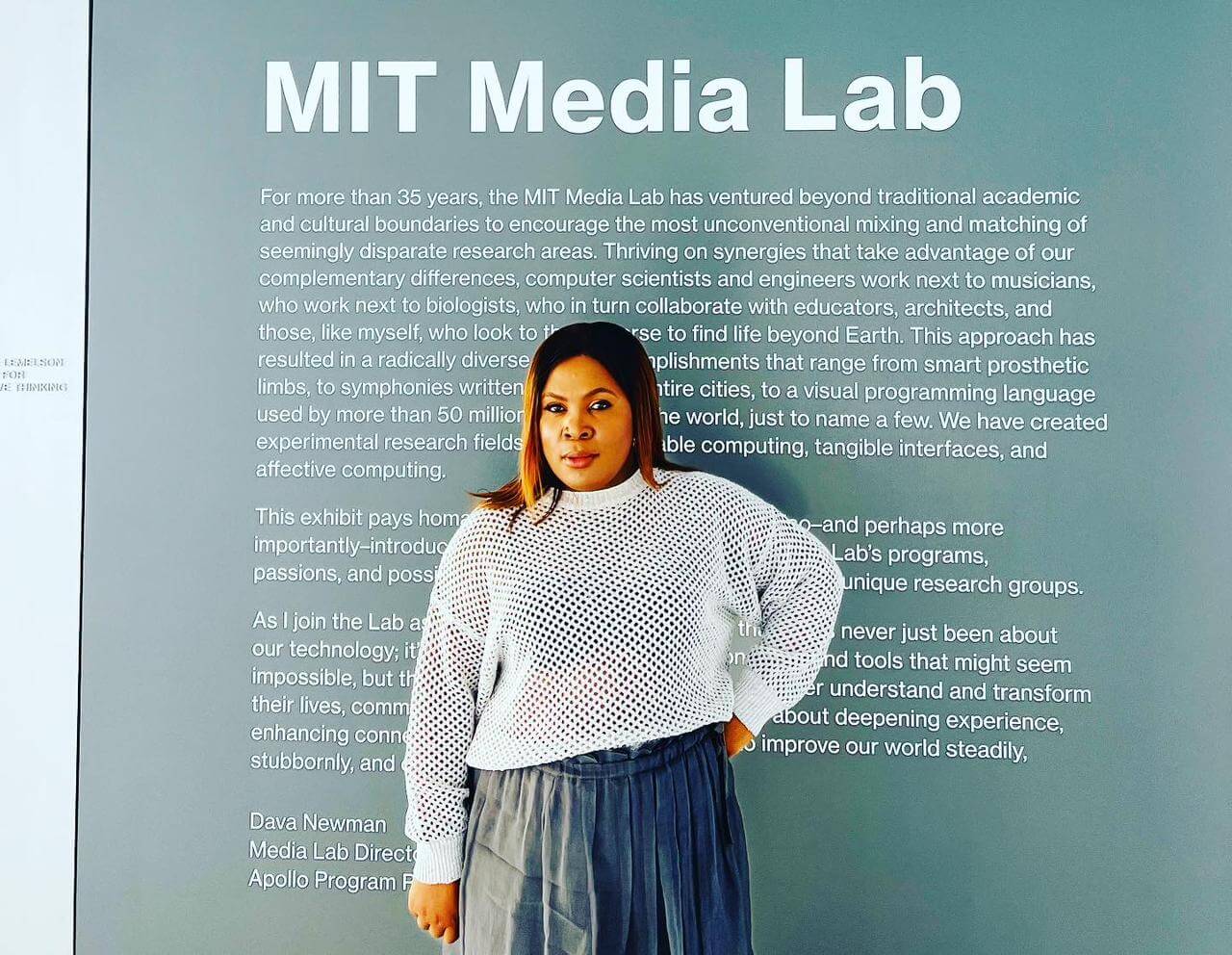

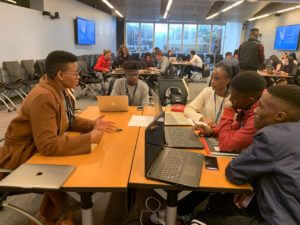
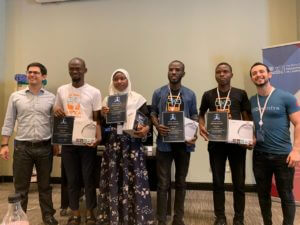
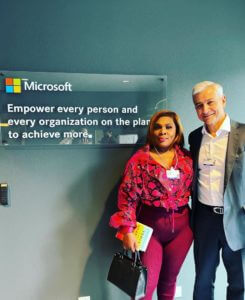
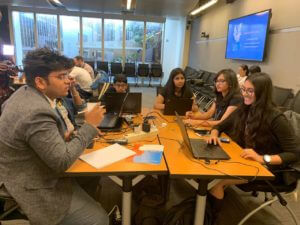

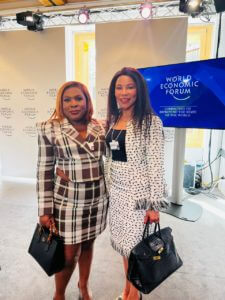
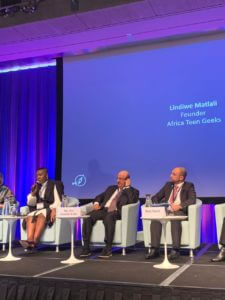
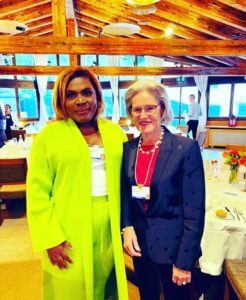
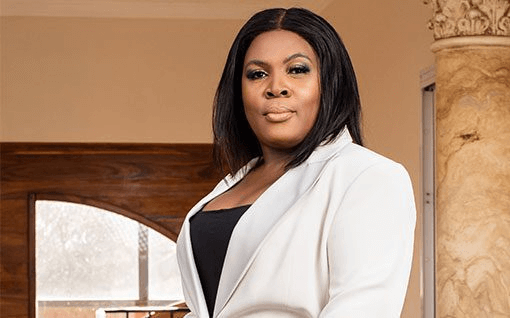

Congratulations; you have set an unprecedented pace in tech women.
Please how can my daughters aged 18 and 17, be involve in this innovation,we are resident in Akwa Ibom, Nigeria, thanks.
I
Do you have an office in Akwa Ibom,nay Nigeria, thanks